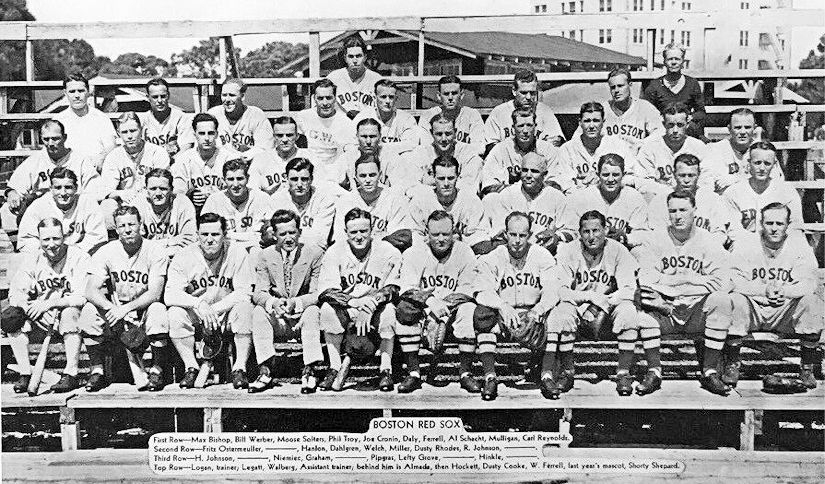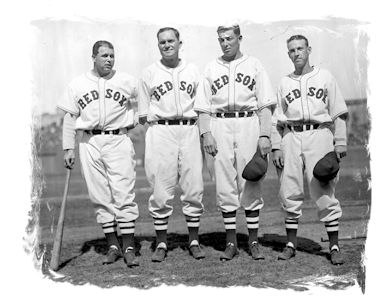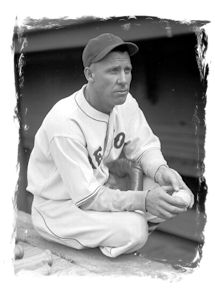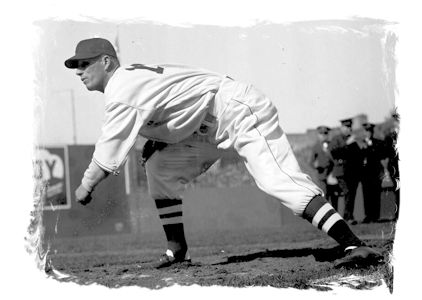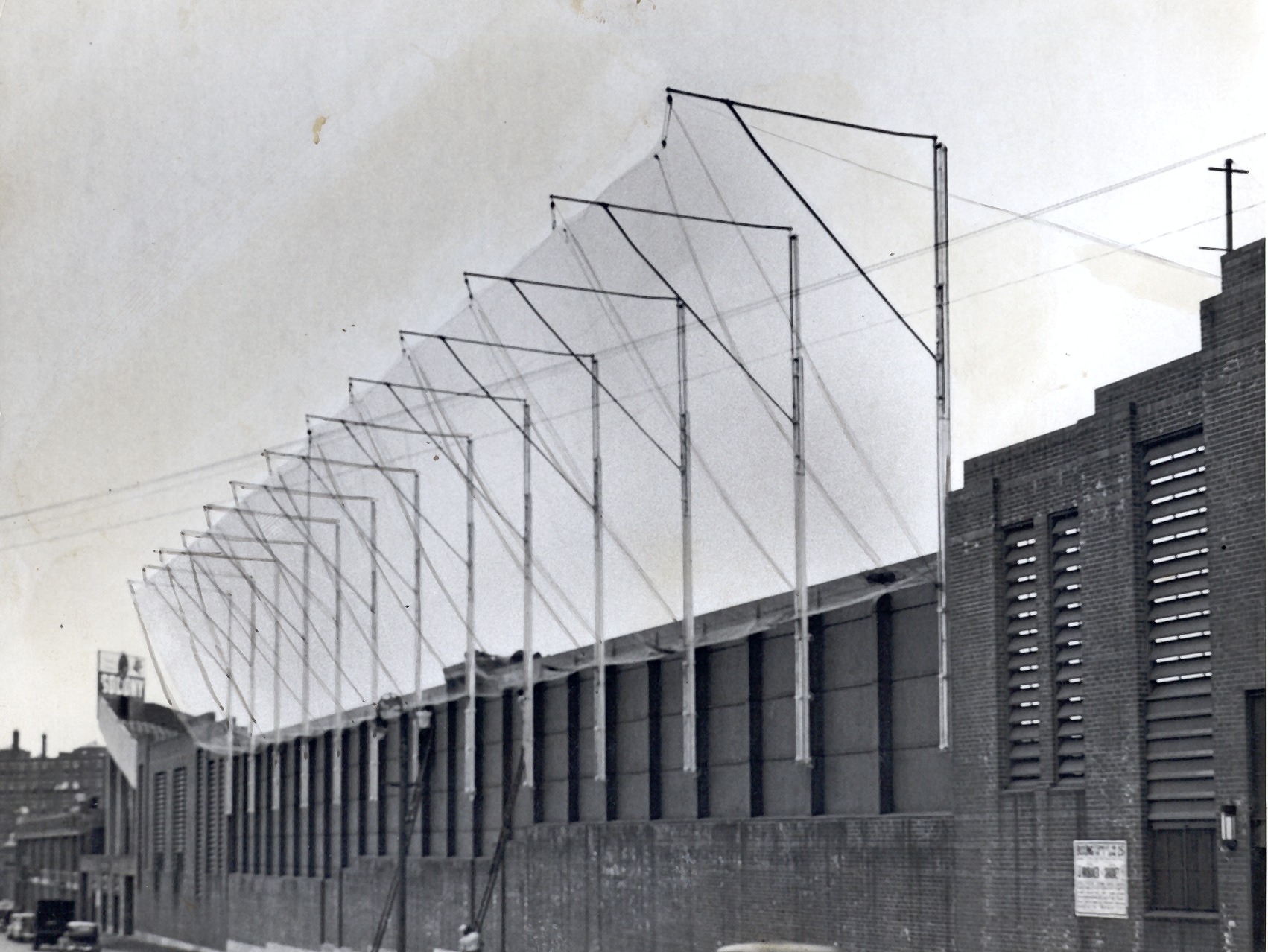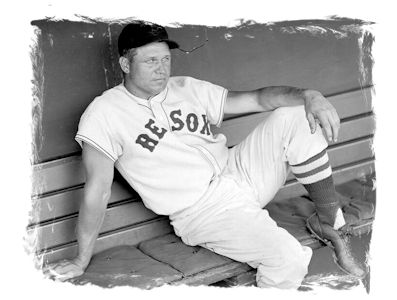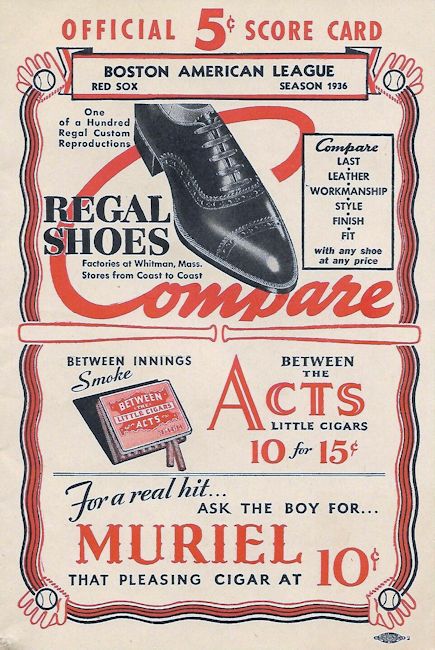1936 BOSTON RED SOX ...
Tom Yawkey's extravagant spending had divided the Red Sox into two camps. There was the general manager Eddie Collins and the overpaid veterans who did not like the younger manager Joe Cronin, and the younger players who were happy just to be playing getting paid to play baseball, rather than being like most of the unemployed and standing in bread lines. Yawkey, not knowing how to bring everyone together, answered by throwing money at them all. One of the very positive things Yawkey did, was to put money into building a Red Sox farm system and had it run by former general manager of the Cleveland Indians, Billy Evans. To stock up on young players, Eddie Collins took a trip to the west coast to see players who played in the Pacific Coast League. He liked what he saw in San Diego and bought the contract of Bobby Doerr. While at practice he saw another young player who hadn't played much, but looked like he had a lot of potential when he swung a bat in batting practice. So Collins took an option on the player ... his name was Ted Williams. In December, there was an unfortunate incident in Durham, NC when Dusty Cooke struck a boy on a bicycle, described an 18-year-old. Cooke put him in the back seat of his automobile and left him on the steps of the hospital. The boy suffered a compound fracture of his leg and Cooke was later arrested for assault and battery with a deadly weapon. At the winter meetings, everyone was eager to see who Yawkey would buy. Aside from Wes Ferrell and Lefty Grove, the team had no pitching and they were terrible defensively. Yawkey and Collins were in negotiations with Connie Mack, who continued to cash out by selling his star players. These meetings were done without talking with manager Joe Cronin, who therefore went to the press with his ideas on what the Sox needed.
On December 10th, Jimmie Foxx and pitcher Johnny Marcum were acquired from Connie Mack, for a minor leaguer named George Savino, pitcher Gordon Rhodes and $150K. Foxx was a bona fide superstar and the first slugger on the Red Sox since Babe Ruth. The move made them instant contenders. Carl Reynolds and Roy Johnson next were traded to Washington for the veteran outfielder Heinie Manush on December 17th. Finally, on January 4th, Yawkey picked up Doc Cramer and Eric McNair for pitcher Hank Johnson, Al Niemic and $75K. Cronin was upset because he was the team's shortstop and now Yawkey had traded for McNair, another shortstop. He immediately went on a diet. One of the more amusing incidents in baseball train travel occurred after the Red Sox and Athletics had finished a series in Boston. The A’s were going back to Philadelphia and the Red Sox to Washington. Both trains left from South Station on different tracks. McNair and Oscar Melillo were already in their berths when Bob Johnson of the Athletics roused McNair, telling him to get out of Johnson’s berth. Both Red Sox players had boarded the wrong train, though they didn’t quite believe it until Connie Mack said, “Good heavens, McNair, I thought I sold you to the Red Sox." The Sox started spring training with one of the strongest lineups in baseball on paper. Billy Werber was moved from third base to play the outfield with Heinie Manush and Doc Cramer. Eric McNair was moved to third, with Cronin at short and Oscar Melillo at second. With Jimmie Foxx at first base and Rick Ferrell behind the plate, the team looked solid. Johnny Marcum who had won 17 games along with 20 game winners, Wes Ferrell, Lefty Grove, and a healthy Fritz Ostermueller also gave the Red Sox a formidable starting rotation.
Marcum was a holdout in the spring, asking for $10,000 but reportedly signing for $7500. He was a little late getting started in April, after some elbow soreness led him to have his tonsils removed at Boston’s St. Elizabeth Hospital. But by the end of the spring, Manush and Melillo were showing their age. Werber hadn't shown up being a holding out for more money, and Cronin continued to struggle in the field while Marcum came up with a sore pitching elbow. Jimmie Foxx also wasn't hitting and had a drinking problem that had become evident. But Yawkey didn't pay much attention because he as well as other players, were staying out late to drink and party also. This Red Sox team was a divided team with very bad chemistry and as the season progressed, it got worse and worse.
The Sox opened the season by crushing the Philadelphia A's at Fenway Park, 9 to 4 on April 14th. Jimmie Foxx had three hits including a triple. But Joe Cronin booted an easy ground ball and was booed by the fans. In the next game, Cronin was cut down at second by Mike Higgins on a ground ball and broke his thumb. Foxx blasted his first homer of the season and the Sox won again, 10-4. With Cronin out of the lineup, the Sox started to play better. Lefty Grove made his first start of the season in New York on April 17th. He was near perfect, allowing just two hits and shutting out the Yankees, 8 to 0. In Philadelphia, on April 19th, Mel Almada lined a single to center that scored Rick Ferrell with the winning run and providing his brother Wes with just enough to win 2 to 1. Wes scattered five hits, two of which were bunched together for the lone Philly run. A ninth inning rally netted the Red Sox three runs and saw Heinie Manush emerge as the hero, as the Sox came from behind and beat Washington 6 to 5 at Fenway Park in the morning game of a doubleheader on April 20th. Lefty Grove allowed the Nats just two hits the next day, beating them 8 to 1. Jimmie Foxx connected for his 5th homer and also collected a double and a single, all of which netted four RBIs. Heinie Manush added four hits while Billy Werber and Rick Ferrell had three each in an 11 to 8 slugfest win for the Sox against Chicago at Fenway on April 28th. The Red Sox won a nerve shattering contest with the Chicago White Sox, 8 to 7, in the bottom of the ninth inning on April 29th. It was only after the home team tossed away the lead four times and four times battled their way back, that Rick Ferrell finally settled the contest driving in the walk-off game winner. Jimmie Foxx came close to breaking a major league record by striking out the first four times he came up, three of them with potential runs on third base and less than two outs. The next game, the Red Sox piled up 16 runs on 18 hits and scored 12 runs in the first two innings, beating up the White Sox 16-4. Eric McNair had four hits including two doubles and a triple.
Lefty Grove shut out the Cleveland Indians, 6-0 on May 1st. He yielded seven hits, two of which were scratches and no two were clustered together in the same inning and struck out nine batters. A couple of days later on May 3rd, Wes Ferrell spun a two-hitter against the Tigers, who took their turn on the Fenway Park stage. Both hits were singles by Goose Goslin. Rick Ferrell supplied much of the offense, clouting a home run and a double. Jimmie Foxx also banged out a homer, his sixth of the young season, as the Sox cruised to a 6-0 victory. The Detroit Tigers were shutout 2-0 on five hits by Grove on May 5th. It was Lefty's (5-0, 0.20 ERA) third consecutive shutout. He also drove in the first run for the Sox, which turned out to be the game winner in the second inning. Jimmie Foxx blasted two homers in the second meeting on May 7th and provided a 9 to 6 triumph. Doc Cramer had three hits and Oscar Melillo knocked out two doubles and a single. The Sox concluded their homestand by taking two from the Browns and enjoyed being in first place, if only by 1/2 game.
Billy Werber accounted for all the Boston runs on May 13th in Detroit. He blasted a three run home run in the fourth inning and Fritz Ostermueller relieved Rube Walberg and then shut down the Tigers for the rest of the game, winning 3 to 1. In the next game, Heinie Manush lined two doubles in support of Lefty Grove who notched his sixth win, in another 3 to 1 victory. Home runs by Werber and Rick Ferrell in the eighth and ninth innings respectively, enabled the Red Sox to come from behind and nip the White Sox in Chicago on May 17th. Werber's home run tied the game at 7-7 and Ferrell's homer was the game winner, making the score 8 to 7. The next day, Grove (7-1) hurled his fourth shutout, beating the White Sox, 2-0. In 65 1/3 innings pitched, Lefty had given up six earned runs on 42 hits and seven walks for a 0.83 ERA.. In St. Louis, Bing Miller's perfect throw home completed a doubleplay to keep the Browns off the scoreboard. Then Jimmie Foxx's 10th homer with two men on, was enough for the Red Sox to win the game 6 to 2 on May 22nd. The Sox (23-12) returned home in first place, but it would be the last time they were able to sit atop the American League. After losing the first two games of the homestand to the Washington Nationals, Fritz Ostermueller played the role of the "stopper", winning 6-0, on May 25th. It was his first career shutout, as he limited the Nats to four scattered hits. On May 26th, Wes Ferrell, Eric McNair and Jimmie Foxx led the Sox to a 5-4 win over the Yankees, in the first of their three game battle for first place. Ferrell drove home the first Sox run in the third inning. McNair gave the Sox a 3-2 lead with his two-run double of the wall in the fourth. Foxx hit a shot over the left-center field wall with a man on, in the eighth inning, upping the lead to 5-2. The next game saw the Sox battle back from a 7-1 deficit, to tie the game in the eighth inning and send it into extra innings. But the Yankees scored a run in the 11th inning and won the game, 9 to 8. The Yanks won the third game also by a 10-6 score. The Sox finished the month in Yankee Stadium and lost in 12 innings. Joe DiMaggio knocked in the game winner with a line drive up the middle that broke a 4-4 tie. And in doing so, pushed the Sox 4 1/2 games behind.
Returning to Fenway to start the month of June, the Sox took three straight from Cleveland. In the first game on June 2nd, the Sox cracked out 15 hits and beat the Indians, 14 to 6. The Sox put up six runs in the first inning and five in the third. Joe Cronin returned to the line-up after breaking his thumb and doubled in two runs. Moe Berg led the Sox with three hits and came close to going five-for-five. Wes Ferrell was part of a pitcher's duel in the next game. Losing 2-1 going into the seventh inning, the Sox rallied for five runs in the seventh inning, and won 6 to 2. In the finale, the Sox had to come from behind twice in giving Lefty Grove his eighth win. The White Sox came to Fenway next on June 5th and threw a scare in the Red Sox, who were leading 8-1 going into the ninth inning, and held on to win 8 to 6. By winning 10-6 in the second game, the Red Sox had won five straight and moved to 1 1/2 games away from the Yankees. Joe Cronin belted his first homer of the Season, with two men on on June 8th. It gave Lefty Grove his ninth win by a 6 to 3 score in the first game of a doubleheader against the Tigers at Fenway. The highlight of Jimmie Foxx’s first season with the Red Sox came on June 16th. He hit his 15th and 16th homers. The first of these home runs cleared the second deck in left field of Comiskey Park and went out of the park. It was the first time that had ever been done. But those were the only two runs the Red Sox could score and they lost, 4 to 2. After the game, Lefty Grove, the losing pitcher, displayed his famous temper. He went into the locker room under a full head of steam and tongue-lashed his teammates. But Foxx refused to hear it and stood up to him on behalf of the team. He told Grove that they were all doing the best they could and he should keep his mouth shut. Grove stormed out of the ballpark and walked the five miles back to the hotel. The next day Jimmie Foxx homered again off the railing of the upper deck in left field. So did Wes Ferrell and his, gave him a 5-0 lead, eventually winning 9 to 4. But the road trip for the rest of the month was not pretty because the Sox went into free fall. Of the next 17 games, to Sox went 3-14 and fell out of the pennant race. The first win was on June 21st, as Ferrell became the first American League pitcher to win ten games. He beat the Browns in St. Louis, 3-0, earning his second two-hit shutout. He gave up just two scratch hits and walked three. The second win belonged to Grove, who won his 10th game two days later, beating the Browns 7 to 6. Foxx knocked out his 19th homer in the sixth inning to tie the game. Joe Cronin (.327 BA) homered, doubled and singled. But he only made one error since returning to the lineup.
The third and final win of the month saw Foxx's two homers putting the finishing touches on the 17 hits and 28 total bases by the Red Sox as they beat the Indians 9-4, at League Park on June 25th. The Sox then finished the road trip by losing seven straight games, including four straight to the first place Yankees, before going home to start the month of July, 11 1/2 games out, and now in fifth place.
One of the things that greeted the Red Sox when they came home were thirteen metal poles on top of the left field wall, that stretched out at right angles over Lansdowne Street. Attached to those poles was netting, to stop the balls hit over the wall, from breaking the windows of tenants on the other side of the street. Some home cooking helped the Sox get back on track, winning their first five games at home. On July 4th the Sox swept a doubleheader from the visiting Philadelphia A's. Lefty Grove helped by Doc Cramer's excellent work in the outfield, blanked the A's in the first game 1-0, on five hits. The second game was another scrappy fight. The Red Sox jumped out front quickly in the first two innings. The A's tied it up, but in the bottom of the ninth, four straight walks gave the Sox a 5-4 win. Led by rookie John Kroner, who enjoyed his very best day since being inserted in the lineup, the Sox swept another doubleheader from the Athletics the next day. There was not much of a battle as the Sox won by scores of 16-2 and 8-2. Kroner hit his second major league homer and knocked out four singles, driving in six runs. At the All Star brea, the Red Sox were 42-34 and tied with the Rigers for second place. The club had been fueled by the performances of Grove and Ferrell, who were a combined 22-11. The All Star Game was played at Braves Field (now called National Field) on July 7th, with the N.L. Stars winning 4 to 3. Rick Ferrell, Jimmie Foxx and Lefty Grove represented the Red Sox. Joe Cronin was picked as a coach. Foxx got an infield hit in two plate appearances. Grove was credited for the loss, leaving in the third inning on the wrong side of a 2-0 score. Joe Cronin helped Wes Ferrell win his 12th game, 7 to 2 on July 9th. Cronin was a wizard in the field, but was able to calm down Ferrell who was losing his temper. Ferrell had given up eight hits and four walks in the first four innings and Cronin gave him a pep talk. Ferrell then gave up only two hits and didn't walk anyone for the remainder of the game. Unfortunately the Sox winning streak ended abruptly and another losing streak of five straight games began. But on July 15th, the Sox had their hitting shoes back on and swept a doubleheader from the St. Louis Browns. Foxx had three hits in the second game including a homer. The next day saw another doubleheader with the Browns. After losing the first game, the Sox triumphed in the second contest, 5 to 4. Jack Wilson augmented a brilliant relief job by supplying a game-winning single in the ninth inning. Foxx belted out his 25th and 26th homers.. Finally, on July 17th, Foxx busted a single over the head of Lyn Lary to send home Wes Ferrell and Heinie Manush in the ninth inning, thus giving the Sox a 2 to 1 walk-off win. The Sox therefore took four of the five games played against the Browns. The Sox next hosted the Detroit Tigers and split a two game set with them. On July 19th, the Sox beat them down by a 12-3 score. Heinie Manush led the assault, going 4-for-5 with two doubles. After tying the Tigers with a two-run ninth inning, the Sox went berserk in Detroit on July 24th. They scored three runs in the 10th to walk away with a 7 to 4 victory. They continued their assault the next game by walloping the Tigers, 18 to 3, scoring 12 runs in the 5th inning. Doc Cramer led the way with a 4-for-5 game. And Jimmie Foxx led the way in the third game, smacking out two homers (#28 & #29), as the Red Sox swept the Tigers, 10-3.
Foxx spurred the Sox to a 7 to 3 win over the White Sox in Chicago, to end the month of July. He blasted his 30th homer, doubled and tripled to drive in three runs. But the Red Sox proceeded to lose the next seven games to start August. In July rookie, John Kroner played in 20 games and never saw his average drop below .400. From June 27th to August 7th, he stayed above the .400 mark, despite being shuffled around from third base to second base and to shortstop. Hot-tempered Wes Ferrell pitched well, but hated Cronin and berated him in the press as a terrible shortstop who was hurting the team. In the second game of a doubleheader on August 2nd, the Sox had a 9-1 lead. Ferrell walked two hitters and began squawking at the umpire for making bad calls. Then Cronin booted a ground ball and a runner scored. Ferrell was angry and threw a wild pitch, later giving up five runs. Cronin took him out and the game was eventually lost 12-11 in extra innings. Ferrell went on to register his 15th win of the season on August 12th against the Athletics at Fenway, winning 6 to 4. He got the win on the wings of not only his pitching, but also his hitting. He blasted two homers, accounting for all the Sox runs, also picking up another single and accounting for three of the seven hits the Sox banged out. Lefty Grove registered his sixth shutout of the season, notching his 14th victory, beating the Washington Nationals 9-0, on August 14th. He wobbled only once, giving up a double to open the third inning, the only extra base hit of the game. Lefty won his 15th game on August 18th in Philly, 6-2. Rick Ferrell was 3-for-4 with a double, a triple and a home run. Cronin's problems with his veteran pitchers persisted. In one game Wes Ferrell saw a pitcher warming up in the bullpen, called Cronin over and told him that he would not throw another pitch until that pitcher sat down. Grove continued to bawl out his fielders. Ferrell also took a shot at Jimmie Foxx, telling reporters that Foxx was spending too much time in the nite clubs, boozing it up. On August 16th, with the first game of a doubleheader tied at three apiece against Washington, the Nats scored three runs on plays that should have been made. Cecil Travis hit a slow grounder that barely evaded Eric McNair, who was plaing shortstop. It ended up being a double because Doc Cramer was playing deep in centerfield. Ferrell again lost his temper and walked off the field in a rage. Cronin needed to put in a pitcher, who hadn't warmed up and the Sox lost 7 to 6. But there was no follow-up to Ferrell's actions and Cronin used him as a pinch hitter in the second game. Then on August 21st, in New York, after McNair made a critical error. Again with nobody warming up in the Sox bullpen, Ferrell threw his glove up in the air and again stormed off the field again, leaving the park and going back to the hotel. Backed up by Eddie Collins, Cronin suspended Ferrell for the season and fined $1000. Ferrell turned around and blasted Cronin to the press, threatening to punch him in the jaw. Tom Yawkey tried to be the peace-maker. He cut the suspension to ten days and rescinded the fine. Regardless, soon after the meeting, Cronin offered Ferrell to the Yankees, but their manager, Joe McCarthy had no interest in getting another troublemaker. As a result, these actions stripped Cronin of any authority and respect he retained with his players. He clearly was shaken by all that had gone on. Many observers thought Cronin, overweight, struggling in the field, and injured, might be through at just 30 years of age. Ferrell turned it around by pitching one of his best games on August 26th, shutting out the Tigers, 7 to 0 at Fenway. When Heinie Manush lost a fly in the sun and Eric McNair air-mailed his throw to first on a grounder, Ferrell showed no emotion. Not only was his deportment noteworthy, but his pitching was brilliant. He allowed five hits and nobody made it past second. The Sox finished August by sweeping a doubleheader from the Indians. In the first game, Eric McNair's fourth straight single drove in the winning run which gave the Sox a 3-2 win in the first game. Wes Ferrell won his 17th game and out-pitched 17 year old rookie, Bob Feller. The Sox swept the day with a 5-1 victory in the second game. Rube Walberg got the win, having allowed just seven hits in his last 15 1/3 innings. September started with Lefty Grove beating the Indians, 4-1, and thus earning his 16th win. The Sox hosted the Yankees and beat them 3-2 in the first game of a September 5th doubleheader. Eric McNair's single in the seventh inning brought in Doc Cramer, who had three hits, with the deciding run. Bing Miller was the oldest player in the majors (age 41), and appeared in only 30 games over the entire year. He played in his last big-league game in the second game of the doubleheader as a pinch-hitter. A few weeks later, the Red Sox named him to replace Al Schacht as a coach.
Babe Dahlgren played a full season with the Syracuse Chiefs and hit .318 with 16 homers with 121 RBIs. He also led the International League with 21 triples. He was called back up to Boston in September, got into 16 games and hit .281 with 7 RBIs. Jimmie Foxx had driven in 143 runs, third in the league. And, impressively, when Dahlgren was called up, Foxx agreed to move to left field for the Red Sox so Dahlgren could work at first base. Wes Ferrell won his 20th game in Philadelphia on September 19th, beating the A's 5 to 1. Wes tripled as did Foxx (3-for-5). One of the most interesting moments involved pitcher Jack Wilson, on September 25th, with a game against the Washington Nats. Wilson got into hot water when Washington loaded the bases on a single and two walks. What happened next would be something he would certainly want to forget. Wilson lost his balance on the rubber, falling to the ground and committing an automatic balk which permitted the runner to score from third unmolested.
The Sox finished their season by splitting a doubleheader with the A's at Fenway on September 27th. Foxx knocked out his 40th and 41st homers of the season, one in each game. The Sox (74-80) had a disappointing second half with a 31-46 record after going 43-34 in the first half. They wound up in sixth place, 28 1/2 games behind the Yankees. The primary problem was their lack of hitting punch. While Foxx batted .338 and drove in 143 runs, he did not lead the league in any of the power categories. Rick Ferrell hit for a .312 average in 121 games behind the plate and again had been selected for the All-Star Game. But the rest of the team was terrible at the plate. In the hih-scoring 1930s, if a player didn't bat .300, with little power (especially at Fenway Park), they were considered below average. The Sox had many plaers that fell into that category. Doc Cramer had a .292 average, although he hit no home runs and did not hit any for more than three years afterwards. Heinie Manush had a .291 batting average and also hadn't hit a homer. And Billy Werber was second to Foxx with only 10 home runs. Manush and Cramer had about the same playing time as Mel Almada and Dusty Cooke (all had 300-odd at-bats). It was a deeper outfield, but Mel’s hitting dropped off, first in spring training which gave Cooke an early leg up. Although hampered by a knee injury, Cooke played in 111 games and batted .273 (.401 on-base percentage), with 47 runs batted in. John Kroner settled in at second base, with the word late in the year that he’d likely be tagged as starter at second in 1937. He finished the season batting .292, with 62 RBIs, in 84 games. Joe Cronin had an injury-filled season and made 23 errors in 86 games. He had lost so much confidence in his fielding, that he went down to one knee to field ground balls. He ended up conceding the position to Eric McNair. McNair proved to be a versatile and valuable addition to the Red Sox infield. He not only played shortstop, but also second base, and third base. He pulled his average up to .285 and drove in 74 runs. The 1936 Red Sox had little pitching depth besides Ferrell and Grove. They were the first theam that Lefty Grove had ever pitched for, that had a losing record. Wes Ferrell (20-15) ended up winning twenty games, the third best in the league and led the American League in innings pitched and complete games. Lefty Grove (17-12) pitched well, but he only struck out 25 batters in his first five complete games. He won his first nine starts, four of them with shutouts, but just couldn't get the breaks to win consistently. Fritz Ostermueller saw more action on the mound, but his 10-16 record was disappointing. He started 23 games, completed seven, and worked 180 2/3 innings. In May of the previous year, he took a shot in the face off the bat of the Tigers’ Hank Greenberg, damaging his nose, jaw, and some teeth. A year later, he still suffered dizzy spells from getting hit. With Ferrell, Grove on the staff, Johnny Marcum was a little overshadowed, but he also had an off year, 8-13, with a 4.81 ERA. At Fenway Park, with Jimmie Foxx, the team was 47-29. The right-handed lineup gave the Sox a definite home-field advantage, particularly against left-handed pitching. The wall made average players into stars and stars into superstars. That thought tainted the team's thinking for years. But left-handed hitters with the huge area of right field, became better hitters overall and that would be found out when Ted Williams came to town a few years later.
|
